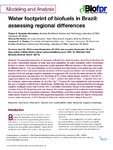Please use this identifier to cite or link to this item:
http://www.alice.cnptia.embrapa.br/alice/handle/doc/974645| Title: | Water footprint of biofuels in Brazil: assessing regional differences. |
| Authors: | HERNANDES, T. A. D.  BUFON, V. B.   SEABRA, J. E. A.   |
| Affiliation: | THAYSE A. DOURADO HERNANDES, BRAZILIAN BIOETHANOL SCIENCE AND TECHNOLOGY LABORATORY VINICIUS BOF BUFON, CPAC JOAQUIM E. A. SEABRA, BRAZILIAN BIOETHANOL SCIENCE AND TECHNOLOGY LABORATORY. |
| Date Issued: | 2013 |
| Citation: | Biofuels, Bioproducts and Biorefining [on-line], 1st November 2013. |
| Description: | The expected expansion of bioenergy in Brazil has raised concerns about the implications for its current comfortable situation of water resources availability. As water availability within the Brazilian territory is uneven, the bioenergy expansion might represent different impacts on the water resources of different regions. This work assessed, at the municipal and state levels, (i) the green and blue water footprint (WF) of the main liquid biofuels produced in Brazil (sugarcane ethanol and biodiesel); (ii) the impacts of full and salvage irrigation strategies on sugarcane WF; and (iii) the water demand for different agricultural land use scenarios. For the states of São Paulo, Minas Gerais, and Goiás, the WF of sugarcane ethanol was evaluated around 71 L MJ?1, while in the state of Paraná it reaches 100 L MJ?1. For biodiesel, values were between 40 and 50 L MJ?1. The blue WF was negligible for both biofuels, as the use of irrigation is still limited in Brazil today. Additionally, the analysis showed that full and salvage irrigation strategies would lead to lower WFs in all states considered, though in the expense of larger volumes of blue WF. Regarding land use change, the results suggested that additional evapotranspiration is occurring due to sugarcane expansion. Nevertheless, given the current situation of the Brazilian water basins, there is no evidence that sugarcane expansion over these areas will lead to critical pressure on water resources. |
| Thesagro: | Cana de açúcar Desenvolvimento sustentavel Recurso hídrico Irrigação Bioenergia Glycine Max Saccharum Officinarum |
| NAL Thesaurus: | Sustainable development Water resources Irrigation Bioenergy Water footprint Brazil |
| DOI: | 10.1002/bbb.1454 |
| Type of Material: | Artigo de periódico |
| Access: | openAccess |
| Appears in Collections: | Artigo em periódico indexado (CPAC)  |










